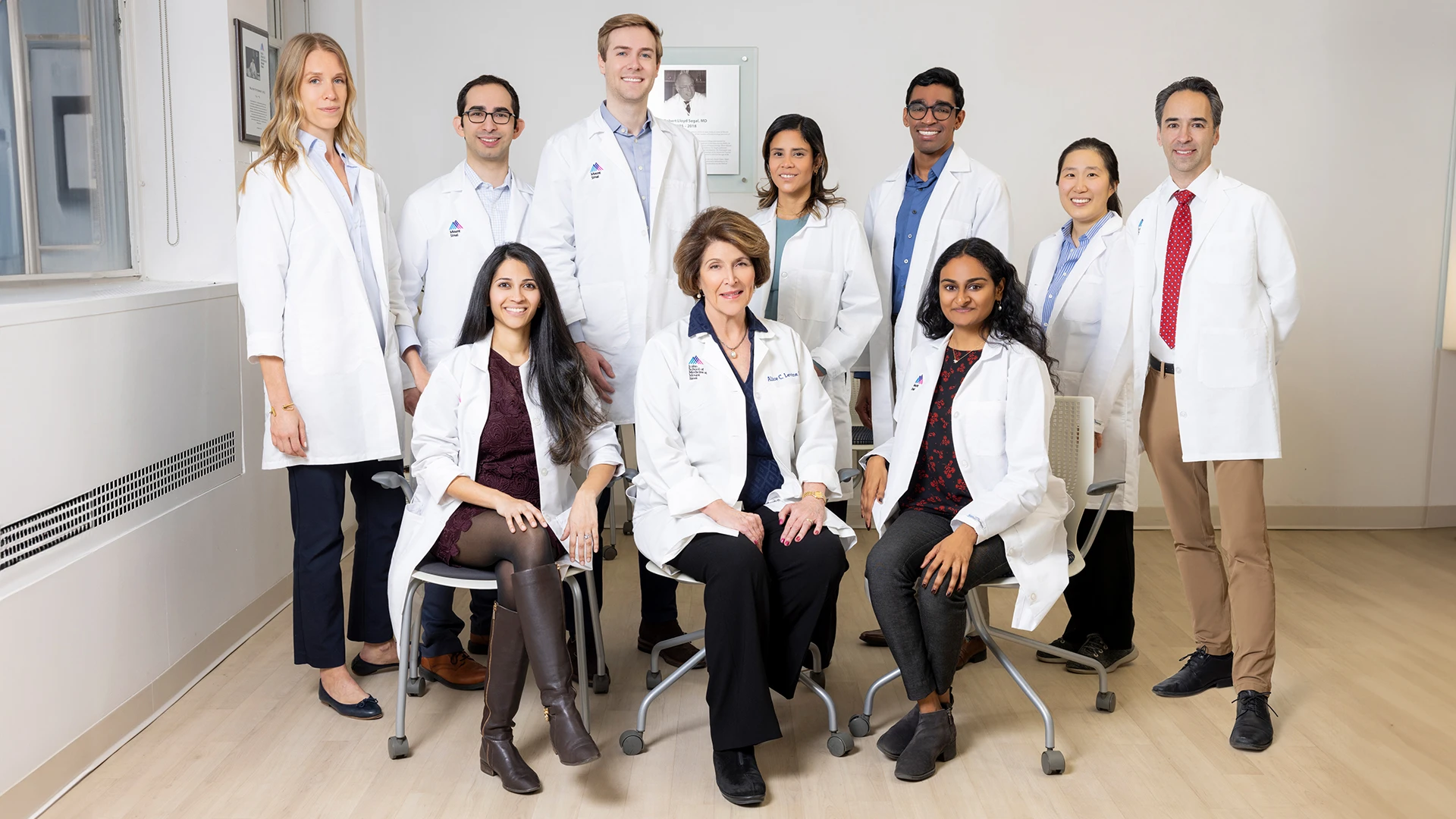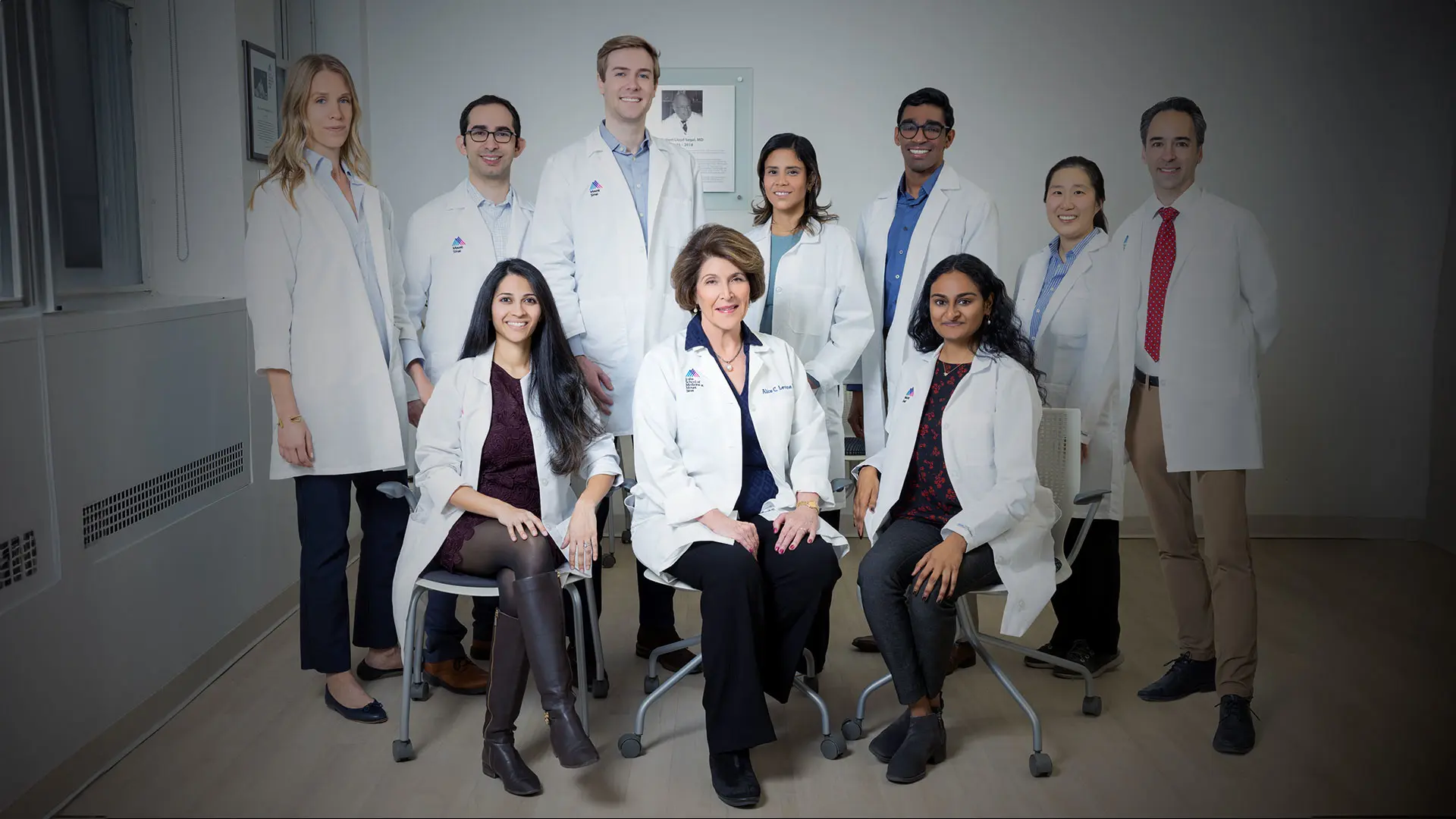The merger of Mount Sinai’s Endocrinology fellowships into a systemwide, five-hospital program has proved successful in its first two years, with the 14 fellows gaining a wide variety of experience in research and clinical care. In the Endocrinology, Diabetes and Bone Disease Fellowship, fellows are treating complex conditions in diverse populations that the Mount Sinai Health System serves, and working closely with renowned experts in the field.
Previously, there were two separate endocrinology fellowships, one housed at Mount Sinai Beth Israel, Mount Sinai Morningside, and Mount Sinai West, and one at The Mount Sinai Hospital and the James J. Peters Veterans Affairs Hospital in the Bronx. Now, there is one broad program with seven fellows per class, who rotate through all five campuses.
“We have the largest program by far in the country since we merged. It has been extremely successful. There is a definite buzz about our fellowship program,” says Alice C. Levine, MD, Director of the fellowship and Professor of Medicine (Endocrinology, Diabetes and Bone Disease), Icahn School of Medicine at Mount Sinai. “Fellows get exposed to many different sites, attendings, and patient populations. It’s been a very exciting endeavor.”
The expanded program allows fellows to choose either a two-year master clinician or three-year physician-scientist track. During the first year, all fellows explore the breadth of endocrinology with hospital rotations encompassing diabetes, adrenal/pituitary, thyroid, bone and mineral, reproductive endocrinology, high-risk obstetrics, obesity medicine, and transgender medicine, learning from world-renowned mentors in each area.
Second-year master clinician fellows divide their time between outpatient clinical work in subspecialty endocrine clinics and scholarly projects in a focused area under the direction of faculty mentors who are, themselves, master clinicians. The physician-scientist fellows spend 75 percent of their second and third years on mentored research, with dedicated funding, and with a view toward developing careers as physician-scientists.
The fellowship program takes advantage of all the strengths of the Mount Sinai Health System, says Co-Director Michael A. Via, MD, Associate Professor of Medicine (Endocrinology, Diabetes and Bone Disease), and Medical Education. “Dr. Levine and I took a lot of feedback from fellows themselves and how they thought things might go,” he says. “With that, we put together a schedule and a curriculum and a series of rotations. So far it’s worked really well.”

Members of the Endocrinology, Diabetes and Bone Disease Fellowship Program: Front row, from left, Sandhya Bassin, MD, Director Alice C. Levine, MD, and Suma Gondi, MD. Back row, from left, Rachel Sheskier, MD, Alon Mazori, MD, Daniel Slack, MD, Natalia Viera Feliciano, MD, Jiby Yohannan, MD, Jane Hand, MD, and Co-Director Michael A. Via, MD
Chief fellow Alon Mazori, MD, is working on several projects related to diabetes in pregnancy with his mentor, Carol J. Levy, MD, Clinical Director of the Mount Sinai Diabetes Center, and Professor of Medicine (Endocrinology, Diabetes and Bone Disease).
“This could not be a better experience—to have all this time to work on an area of interest that you’re truly passionate about, to be working with an international leader in this space, one on one, who is invested in your research and professional development, and to really be structurally nurtured and fostered in this way,” Dr. Mazori says.
Working closely with mentors, fellows are immersed in a wide range of subjects, including:
Leah Kaplan, MD, is studying diabetes technology and outcomes in preventing readmission with mentor Grenye O'Malley, MD.
Jiby Yohannan, MD, was studying the tissue effects of transgender hormone therapy with mentor Tamar Reisman, MD.
Rachel Sheskier, MD, is studying adrenal insufficiency and new therapeutic targets in adrenal cortical cancer, with Dr. Levine, and participating in a multidisciplinary effort to address the common issue of secondary adrenal insufficiency.
Sandhya Bassin, MD, is conducting a study of glucose monitoring as an intervention in patients with prediabetes with mentor Reshmi Srinath, MD.
Natalia Viera Feliciano, MD, is studying the detection of eating disorders in patients with type 1 diabetes with mentor David Lam, MD.
Daniel Slack, MD, recently published an article on the safety of testosterone therapy for transmasculine people with mentor Joshua Safer, MD.
Dr. Mazori, who is in his second year of the master clinician program, also completed his residency at Mount Sinai and worked with earlier classes of fellows. With this perspective, he appreciates the variety, camaraderie, and support of the merged program.
“I’ve been able to rotate to the different hospitals to learn about different endocrinology topics from different experts and get exposure to different styles and techniques,” Dr. Mazori says. “There was some cooperation among areas previously, but it wasn’t as formalized as it is now. I think that whenever you can facilitate and streamline the process, you ultimately get better results.”
Inspired by his work with Dr. Levy, a leader in the research and treatment of type 1 diabetes, Dr. Mazori is considering specializing in that area clinically. However, “so much has happened over the last two years and Mount Sinai has so many opportunities. I want to develop strong connections both to patients and to the education development of trainees. I’m excited to see where the future takes me.”
All 14 current fellows opted to join the two-year master clinician track. That is not surprising, Dr. Via says. “It’s kind of a rare person who wants to spend the majority of their time and their career doing research, as opposed to the master clinician track, where people spend most of their time taking care of patients. That’s why a lot of people go into medicine.”
Dr. Mazori knows he made the right decision. “If I had the opportunity to go through fellowship again, I would pick the same program in a heartbeat, without hesitation.”
